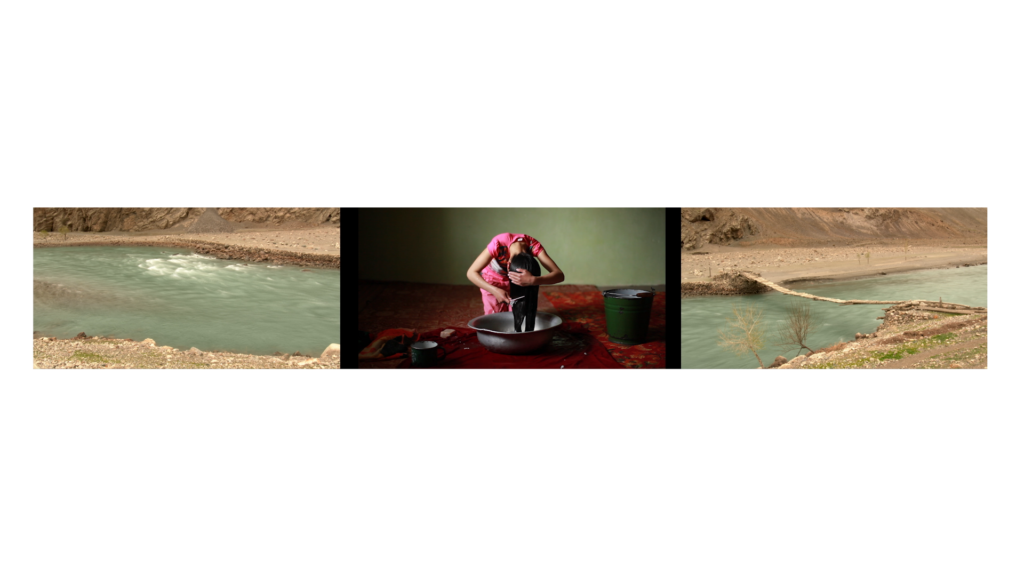Liquid Grounds exhibition
Cet événement a déjà eu lieu.





Opening Wednesday, May 7, 2025 at 7 p.m.
Curator: Vittorio Parisi
From a feminist perspective that interweaves the geological and the political, the collective and the individual – if not the very personal – this exhibition by Saodat Ismailova and Elena Mazzi questions the “liquid soil”, a concept dear to philosopher Luce Irigaray, enunciated in her 1980 essay, both dense with theory and poetry, Friedrich Nietzsche’s Marine Lover.
Conceived as a declaration of love addressed to the German philosopher, the text is rich in exhortations, including the one that gives the exhibition its title: “Souviens-toi donc de sol liquide”. In an attempt to (re)reconcile Nietzsche philosophically with water – an element whose absence from the work Irigaray emphasizes – and, by symbolic extension, with the feminine, the author proposes that we remember our past as aquatic creatures, the essential state of “water body” shared by humans and all living beings on the planet.
A term derived from the vocabulary of geology, designating any type of water body – from the ocean to a lake, from a river to a puddle – “body of water” (or “bodies of water”) was transformed into the concept-pivot of the so-called “hydrofeminist” current by theorist Astrida Neimanis in her 2019 essay Bodies of Water. Posthuman Feminist Phenomenology . Here, Neimanis invites us to consider the human body as an inseparable element of the natural world and, through its own aqueous constitution, in continuity with all other living things.
This continuity between the human, the living and the water is particularly present in the works of Saodat Ismailova (1981-), an Uzbek artist and director working at the crossroads between documentary and fiction. For Liquid Grounds, she presents the audiovisual installation Stains of Oxus, produced by Le Fresnoy in 2016.
The work recounts the relationship between the Amu Darya River – one of Central Asia’s vital arteries, formerly known as the Oxus – and the communities that live along its banks. Flowing between Lake Bulunkul in Tajikistan and the Aral Sea in Karakalpakistan, the river is witness to a morning ritual shared by the inhabitants of different villages, consisting in the act of whispering their own dreams to the water. The river thus becomes not only a living archive of stories, identities and collective resilience, but above all a veritable collective “body of water”: revisiting their dreams and destinies, the people we meet become one with Oxus.
On the occasion of Liquid Grounds, Italian artist Elena Mazzi (1984-) presents a body of sculptures and a photographic installation, respectively entitled Becoming and Unbecoming With (2018-2020) and Self-portrait with a whale backpack (2018). The works are born of the artist’s personal experience, marked by an accident during a dive from a cliff, resulting in the rupture of several vertebrae, and a period of forced sedentariness. Feeling the need to create a new connection between her body and the seascape, Elena Mazzi made a long journey to Iceland, settling in a fjord.
The dialogue that emerges between the two artists’ pieces is that of two perspectives that are geographically (and geologically) distant, but close in their shared, feminist way of speaking about the environment and humanity.
Thus the ultimate aim of Liquid Grounds, both in the works and discourses it shows and deploys, and in its curatorial presuppositions, is to present a double narrative of transformation and mixing. Or, to put it better, of the liquefaction of the individual in the collective, of the body in space, of the self in the other-than-itself.
The Centre d’art would like to thank Pascale Pronnier – Le Fresnoy – Studio national des arts contemporains for her contribution to the conception of the exhibition, and Artopia Gallery, Milan, for its support in the production of Elena Mazzi’s works.

Practical information
Dates: May 8 to August 24, 2025
Opening hours: every day except Tuesday, from 2pm to 6pm (2pm to 7pm in July and August).
Free admission, no reservations required.